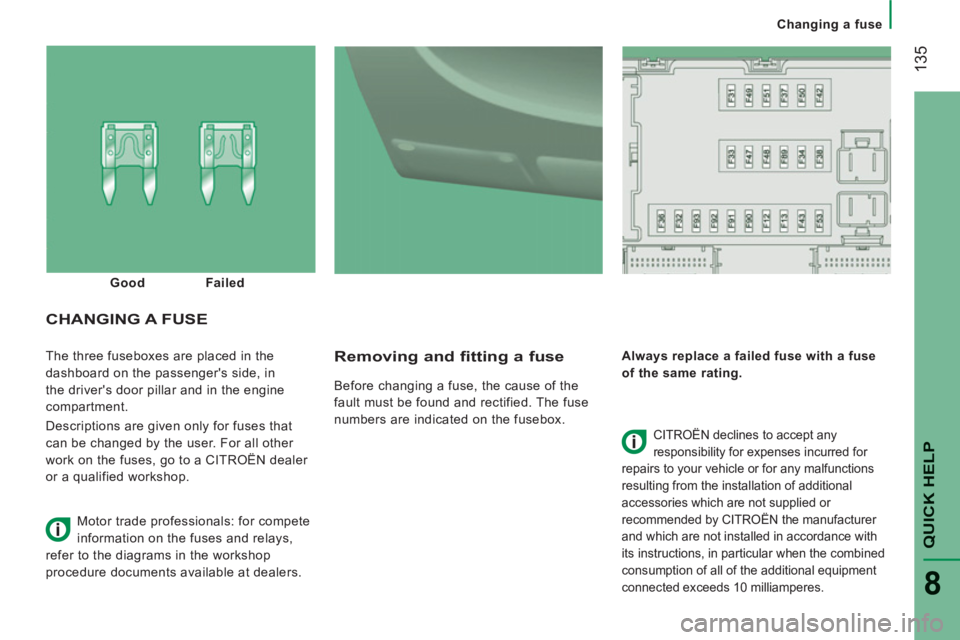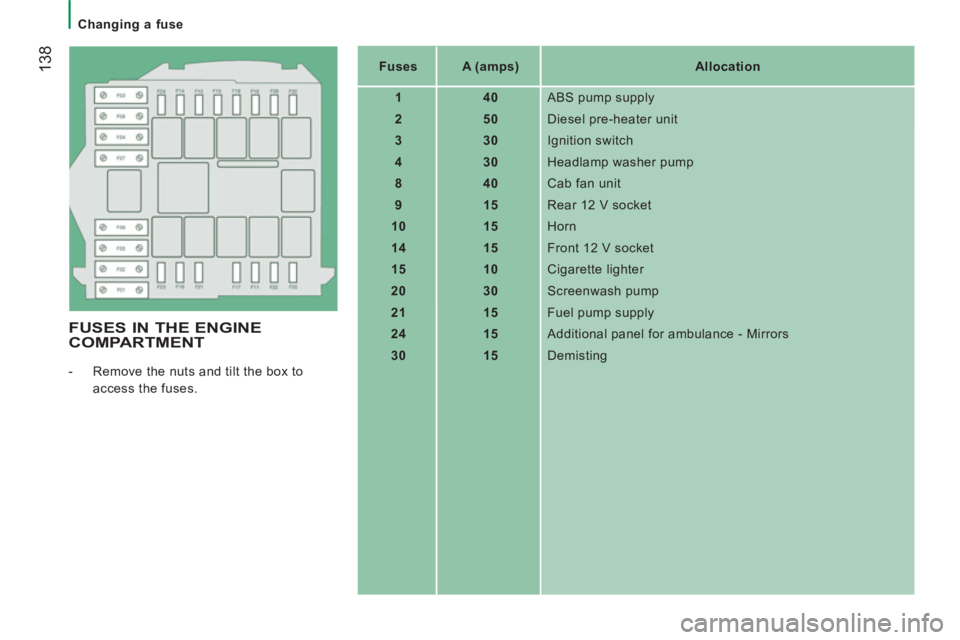CITROEN RELAY 2012 Handbook (in English)
Manufacturer: CITROEN, Model Year: 2012, Model line: RELAY, Model: CITROEN RELAY 2012Pages: 182, PDF Size: 4.76 MB
Page 131 of 182

12
9
QUICK HEL
P
8
Changing a wheel
PUNCTURE REPAIR KIT
Procedure
- Apply the parking brake. Unscrew the
tyre valve cap, remove the filling hose B
and screw the ring E
onto the tyre valve,
- start the engine,
- insert the connector G
into the nearest
power socket on the vehicle,
- switch on the compressor by placing the
switch F
in position I
(on),
- inflate the tyre to a pressure of 4 bars.
To obtain a more accurate reading, you are
advised to check the pressure value on the
pressure gauge H
, with the compressor off.
- check that the switch F
on the
compressor is in position 0 (off), This temporary puncture repair kit is located
at the front of the passenger compartment.
It consists of:
- a cartridge A
, containing the sealant
fluid, equipped with:
●
a filling hose B
,
●
a sticker C
indicating "max. 80 km/h",
which the driver must affix in full view
(on the dashboard) after repairing
the tyre,
- a quick guide to use of the repair kit,
- a compressor D
equipped with a
pressure gauge and unions,
- adaptors, for the inflation of various
items.
Page 132 of 182

Changing a wheel
- If a pressure of at least 3 bars
is not
reached within 5 minutes, disconnect
the compressor from the valve and the
power socket, then move the vehicle
forward by approximately 10 metres to
distribute the sealant fluid inside the
tyre.
- Then repeat the inflating operation:
●
if a pressure of at least 3 bars
is not
reached within 10 minutes, switch off
your vehicle: the tyre has suffered too
much damage and repair has not been
possible. Consult a CITROËN dealer.
●
if the tyre has been inflated to a
pressure of 4 bars
, set off again
immediately.
After driving for approximately 10 minutes,
stop and check the pressure of the tyre
again.
Adjust the pressure if necessary and contact
a CITROËN dealer as soon as possible.
Checking and adjusting the pressure
The compressor can only be used to check
and adjust the pressure.
- Disconnect the hose I
and connect it to
the tyre valve directly; the cartridge will
then be connected to the compressor
and the filling fluid will not be injected.
If it is necessary to deflate the tyre, connect
the hose I
to the tyre valve and press the
yellow button, placed in the centre of the
switch on the compressor.
Replacing the sealant fluidcartridge
To replace the cartridge, carry out the
following operations:
- disconnect the hose I
,
- turn the cartridge to be replaced
anticlockwise and lift it,
- insert the new cartridge and turn it
clockwise,
- reconnect the hose I
and connect the
hose B
in its location.
The cartridge contains ethylene-glycol,
a product which is harmful if swallowed
and which causes irritation to the eyes.
Keep out of reach of children.
After use, do not discard the cartridge in the
environment, take it to a CITROËN dealer or to
an organisation responsible for its collection.
This replacement kit is available from
CITROËN dealers.
Page 133 of 182

131
QUICK HEL
P
8
Changing a bulb
TYPES OF BULB
Various types of bulb are installed on your
vehicle. To remove them:
CHANGING A BULB
Type A Entirely glass bulb: pull gently
as it is fitted by pressure.
Type B Bayonet bulb: press on the bulb
then turn it anticlockwise.
Type C Cylindrical bulb: move aside the
contacts.
Type D - E Halogen bulb: release the
retaining spring from its
housing.
FRONT LAMPS
Open the bonnet. To access the bulbs, reach
behind the headlamp unit.
Carry out the operations in reverse order to
refit each bulb.
Page 134 of 182

132
Changing a bulb
1 - Dipped beam headlamp
Type D
, H7 - 55 W
- Remove the cover by turning it
anticlockwise.
- Disconnect the electrical connector.
- Release the retaining spring by pressing
on the two clips.
- Change the bulb taking care to align the
metal part with the grooves on the lamp.
3 - Main beam headlamp
Type E
, H1 - 55 W
- Remove the cover by turning it
anticlockwise.
- Disconnect the electrical connector.
- Release the retaining spring by pressing
on the two clips.
- Change the bulb taking care to align the
metal part with the groove on the lamp.
2 - Sidelamp
Type A
, W 5 W - 5 W
- Remove the cover by turning it
anticlockwise.
- Remove the bulb holder fitted by
pressure.
- Change the bulb.
4 - Direction indicators
Type B
, PY 21 W - 21 W
- Turn the bulb holder a quarter turn
anticlockwise.
- Remove the bulb by pressing it lightly
while turning it anticlockwise.
- Change the bulb.
5 - Foglamps
Type D
, H1 - 55 W
- Turn the steering fully to the left.
- Unscrew the screw located in the wheel
arch then open the flap.
- Remove the cover.
- Disconnect the electrical connector.
- Release the retaining spring by pressing
on the two clips.
- Change the bulb taking care to align the
metal part with the grooves on the lamp.
Halogen bulbs must be changed after
the headlamp has been off for several
minutes (risk of serious burns). Do not touch
the bulb directly with your fingers, use lint-
free cloths.
When each operation has been completed,
check the operation of the lamps.
When using a high pressure washer
on stubborn dirt, do not persist on the
headlamps, the lamps and their edges to
avoid damaging their lacquer finish and
seals.
Page 135 of 182

QUICK HELP
8
Changing a bulb
DIRECTION INDICATOR SIDE
REPEATER
Type A
, W 16 W F - 16 W
- Move the mirror glass to access the
screws.
- Unscrew the two screws using the
screwdriver supplied.
- Pull the bulb holder to release it from the
dog points.
- Pull the bulb then change it.
Front/Rear
COURTESY LAMPS
Type C
, 12 V 10 W - 10 W
- Press the points, indicated by the
arrows, then remove the courtesy lamp.
- Open the protective flap.
- Change the bulb moving aside the two
contacts.
- Ensure that the new bulbs are secured
correctly between the two contacts.
- Close the protective flap.
- Fix the courtesy lamp in its housing and
ensure that it is secured correctly.
SIDE MARKER LAMPS
Type A, W5W - 5W
- If your vehicle is fitted with these lamps
(van type L4), unscrew the two screws
using the screwdriver supplied.
- Pull the bulb holder to release it from the
lugs.
- Pull the bulb then change it.
Page 136 of 182

134
Changing a bulb
REAR LAMPS
For more information on the bulbs, refer to
the table "Types of bulb".
- Remove the two fixing nuts.
- Pull the lens block from the outside.
- Unscrew the three screws using the
screwdriver supplied (under the front
passenger seat) and extract the bulb
holder.
- Remove the faulty bulb by pressing it
lightly while turning it anticlockwise.
- Change the bulb.
1.
Brake/sidelamps
Type B,
P 21/5 W - 5 W
Type B , P21W - 21W
- Unscrew the two screws.
- Remove the lamp.
- Remove the bulb holder moving aside
the two tabs.
- Remove the faulty bulb by pressing it
lightly while turning it anticlockwise.
- Change the bulb.
2.
Direction indicators
Type B,
PY 21 W - 21 W
3.
Reversing lamps
Type B,
P 21 W - 21 W
4.
Foglamps
Type B,
P 21 W - 21 W
- Identify the faulty bulb then open the
rear doors.
- Disconnect the electrical connector.
NUMBER PLATE LAMPS
Type A,
C 5 W - 5 W
- Press the point, indicated by the arrow,
then remove the plastic lens.
- Change the bulb by moving aside the
two contacts.
- Ensure that the new bulbs are secured
correctly between the two contacts.
- Replace the plastic lens and press on it.
Page 137 of 182

135
QUICK HELP
8
Changing a fuse
The three fuseboxes are placed in the
dashboard on the passenger's side, in
the driver's door pillar and in the engine
compartment.
Descriptions are given only for fuses that
can be changed by the user. For all other
work on the fuses, go to a CITROËN dealer
or a qualified workshop. Removing and fitting a fuse
Before changing a fuse, the cause of the
fault must be found and rectified. The fuse
numbers are indicated on the fusebox.
Always replace a failed fuse with a fuse
of the same rating.
CHANGING A FUSE
CITROËN declines to accept any
responsibility for expenses incurred for
repairs to your vehicle or for any malfunctions
resulting from the installation of additional
accessories which are not supplied or
recommended by CITROËN the manufacturer
and which are not installed in accordance with
its instructions, in particular when the combined
consumption of all of the additional equipment
connected exceeds 10 milliamperes.
Good
Failed
Motor trade professionals: for compete
information on the fuses and relays,
refer to the diagrams in the workshop
procedure documents available at dealers.
Page 138 of 182

136
Changing a fuse
PASSENGER'S SIDE DASHBOARD FUSES
- Remove the bolts and tilt the box to access the fuses.
Fuses
A (amps)
Allocation
12
7.5
Right-hand dipped beam headlamp
13
7.5
Left-hand dipped beam headlamp
31
5
Relay supply
32
7.5
Interior lighting
33
20
Battery sensor
34
20
Minibus interior lighting - Hazard warning
36
10
Audio system - Diagnostic socket - Alarm siren - Programmable additional heating controls - Air conditioning
controls - Tachograph - Battery
37
7.5
Brake lamps switch - Third brake lamp - Instrument panel
38
20
Central locking
42
5
ABS control unit and sensor - ASR sensor - ESP sensor - Brake lamps switch
43
20
Windscreen wiper motor
47
20
Driver's electric window motor
48
20
Passenger electric window motor
49
5
Audio system - Instrument panel controls
50
7.5
Airbags and pre-tensioners unit
51
5
Tachograph - Cruise control - Air conditioning controls - Reversing lamps - water in Diesel sensor
53
7.5
Instrument panel
89
-
Not used
90
7.5
Left hand main beam headlamp
91
7.5
Right han main beam headlamp
92
7.5
Left hand foglamp
93
7.5
Right hand foglamp
Page 139 of 182

QUICK HEL
P
8
Changing a fuse
Fuses
A (amps)
Allocation
54
-
Not used
55
15
Heated seats
56
15
12 V socket
57
10
Programmable additional heating
58
15
Demisting: left hand rear screen
59
15
Demisting: right hand rear screen
60
-
Not used
61
-
Not used
62
-
Not used
63
10
Programmable additional heating switch
64
-
Not used
65
30
Programmable additional heating fan
DRIVER'S DOOR PILLAR
FUSES
- Unclip the cover.
When you have finished, close the cover
carefully.
Page 140 of 182

138
Changing a fuse
FUSES IN THE ENGINE
COMPARTMENT
- Remove the nuts and tilt the box to
access the fuses.
Fuses
A (amps)
Allocation
1
40
ABS pump supply
2
50
Diesel pre-heater unit
3
30
Ignition switch
4
30
Headlamp washer pump
8
40
Cab fan unit
9
15
Rear 12 V socket
10
15
Horn
14
15
Front 12 V socket
15
10
Cigarette lighter
20
30
Screenwash pump
21
15
Fuel pump supply
24
15
Additional panel for ambulance - Mirrors
30
15
Demisting